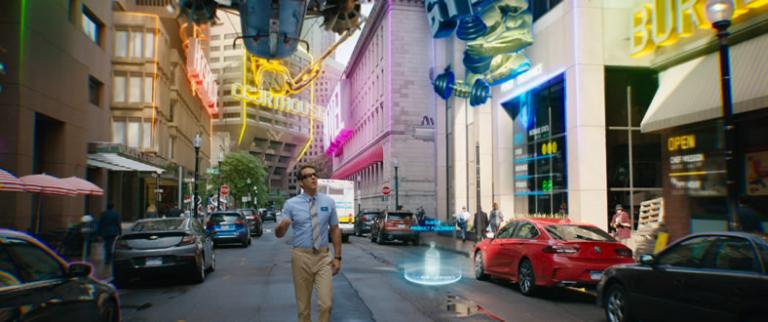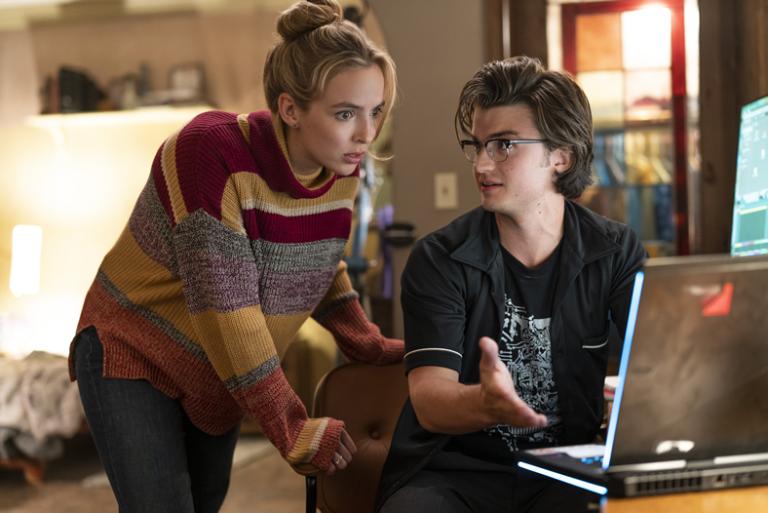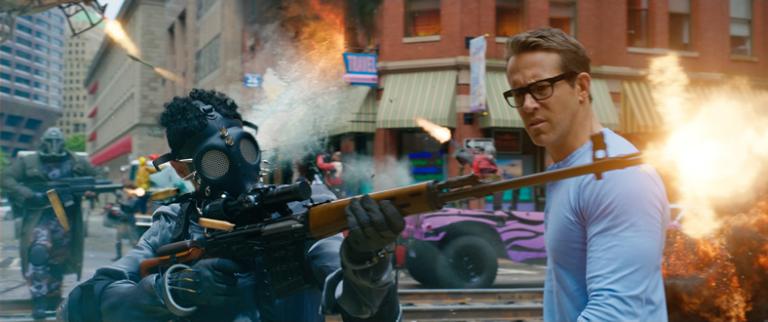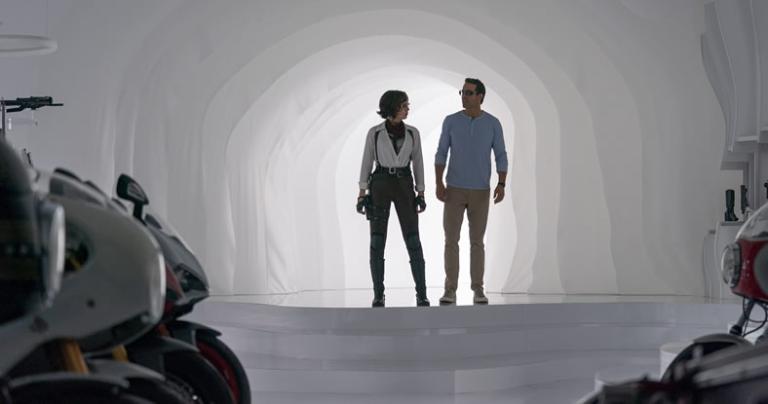- Forgiveness
- Resurrection
- Kamala Harris
- Supreme Court

- Religious Music & Entertainment

Four Things that Free Guy Says About Free Will (and Other Stuff, Too)

You don’t expect a lot of spiritual depth from a Ryan Reynolds comedy. But Free Guy —a fun, zany film featuring Reynolds in full PG-13 Deadpool-lite mode—has more heft than you’d expect.
First, a quick setup: Free Guy (in theaters today) takes place mainly inside a videogame—a massively multiplayer online role-playing game that looks something like a T-rated version of Grand Theft Auto . Free City is filled to the digital gills with murders, car chases, explosions and, of course, hundreds of mindless non-player characters (NPCs) that go about their pre-programmed routines until someone punches them, runs them over or blows them up.
But in the digital confines of Free City , maybe these NPCs aren’t so mindless after all.
Take Guy, a blue-shirted bank teller with a yen for coffee, bubble-gum ice cream and sneakers he can’t afford. Oh, he loves his life in Free City. He’s programmed to. He takes the abuse and the violent deaths in stride, and he’s never missed a day of work.
But he feels a strange longing, too—a desire to fall in love. He imagines, even dreams , of a perfect woman, a woman whom he feels he’s meant to be with.
This, obviously, is not typical for an NPC. No matter how chatty your followers are in Fallout 4 , they honestly don’t care a whit about whether you die in the next super-mutant attack or not. But Guy is more than just a clump of programming. There’s something else in his code, it seems. Something wholly unexpected. And when he sees the woman of his dreams—the very woman he’s been pining for so long—his code takes a quantum jump forward.
Guy realizes that he must talk with her, no matter what his program technically tells him he should do. To do that, he’ll need a pair of sunglasses—the defining difference between human player avatars and NPCs. So he fights a would-be bank robber, grabs his shades and becomes a Free City player—an NPC gone rogue.
That twist not only opens the door for Guy to truly “live” in his digital world, but it allows us to think about the nature of creation, life and free will itself.

When Guy meets his dream lady—Molotov Girl in the game, Millie in real life—she mentions that she’s met the creator of Free City—a guy named Antoine–and he’s kind of a jerk (using a more colorful term).
“You’ve met God?” Guy gasps. “And he’s a d–k?”
But turns out, that’s not precisely true. Oh, he’s a jerk, no doubt. But we learn that Free City wasn’t entirely Antoine’s creation. Seems he used code from a beautiful, more idealistic game as the basis for his freewheeling metropolis. We see images of that original world at times, and it sometimes looks a little like Eden.
Fitting. Free Guy , in a way, echoes the story from Genesis.
According to the Bible, our world was a much better place once, too—a paradise without sin and strife. That changed when Adam and Eve munched on a bit of forbidden fruit (with a little persuasion from Satan) and introduced sin and rebellion into Eden and opened the world to Satan’s corruption. That’s key, because in Christian theology, Satan can’t create anything: He can only twist and contort God’s handiwork.
We see very much the same narrative play out in Free Guy, because Antoine (obviously the movie’s posturing villain) persuaded the original key-holders of that better digital world to turn their creation over to him. He didn’t so much incorporate his own Free City world with this digital “Eden,” but rather overlaid Free World on top of it. In other words, Free City wasn’t his creation at all; it was his corruption of that original creation. And just as an act of rebellion was the beginning of Eden’s downfall, Free City is predicated on rebellion—with players robbing banks and killing people and generally doing everything that, in real life, we know not to do.

Obviously, NPCs in most games are not designed to be self-aware, autonomous actors. They do what they’re told, and so it was supposed to be in Free City, too. But in Free Guy , we learn that, in Free City’s Eden-like predecessor, NPCs were supposed to be reasonably autonomous. They were programmed to learn and to grow. Guy is a product of that Eden. And while he was programmed to fall in love, he took that programming and ran to wildly unexpected places. He began to write his own code.
The biblical Eden featured two characters who weren’t all that different from Guy. Adam and Eve were both designed in certain ways. They were built to reflect God’s own image (like NPCs are designed to reflect ours). They were given certain tasks. And they, like Guy, were made with an intrinsic desire to love and be loved—especially by their Creator.
But they were also imbued from the very beginning with free will. They could choose to reject God. They could choose to sin. And even though we too are “programmed,” either genetically or environmentally, with different preferences, inclinations, strengths and weaknesses, we ultimately choose our own destiny. Will we give into temptation? Will we use the gifts that God has given us? We make a million choices every day, and many of those either bring us closer to, or push us farther from, God.
In Free Guy , our hero makes his own choices, and many of them have an important moral component to them. But he’s not the only (ahem) guy with free will.

A Fallen World
When he gets his sunglasses, Guy makes a critical choice: to be a hero. “I never hurt innocent people,” he says, and that just might make him Free City’ s one truly good fellow. The movie makes it pretty obvious that the game’s real players—those with real free will—mostly act like a big bunch of jerks. So remarkable is Guy’s do-gooding that he becomes a real-world celebrity.
That’s pretty telling. Free Guy seems to suggest that, left to our own devices, we’re not the great people we imagine ourselves to be.
Sure, gamers do things in games that they’d never do in real life. And most are playing under the illusion, of course, that the NPCs they punch in the nose are just a bunch of code. But these gamers ruin the game for other real-world gamers, too—something that Free Guy’ s human characters point out often. Many of us ask two questions in the midst of many of our choices: What’s in it for me? And What can I get away with? And while most of us also ask, What’s the right thing to do? too, sometimes our more selfish and destructive impulses get the better of us.
We like to tell ourselves that we’re good people, and in some respects I’m sure we are. But according to the Bible, we’re sinful creatures deep down. And you only need to step inside an online videogame or scan a typical Twitter feed to see the ugliness in humanity come out.
And in light of that, I think I know what Free Guy’s sequel will look like. Or, at least, what it should.


Promised Land?
But will it stay happy?
We know what happened in the original Eden. We know, too, what happened in Moses’ Promised Land. Even without Antoine in the mix, free will is volatile. When we’re free to make decisions, we often make bad ones. And as Guy’s NPCs become authors of their own destinies, things could get pretty messy.
But they, and we, can make good choices, too. That’s really the central tension of most of our stories, right? Choosing between what we want to do and what we should do. Sometimes, there’s no conflict between the two: Guy wanted to be a good guy, and it was the right choice, too. But sometimes, we must choose one over the other. Every sentient, free-willed creature understands this. And Guy and his freed NPC minions will certainly come to understand that, too.
Free Guy is a fun movie—with, of course, some content issues that you can read about in my review at Plugged In . But if you decide to go, you don’t need to necessarily stop your engagement with a smile and a laugh. There’s plenty to think about here, too.
- Editor's Choice
- Ryan Reynolds

- Library of World Religions
- Advertise With Us
- Write for Us
- Privacy Policy
- Terms of Service
- Do Not Sell My Data
- Radiant Digital
- Manage Newsletter Subscriptions
- Unsubscribe From Notifications
Free Guy and Biblical Freedom
Zachary Lee • September 9, 2021
Riffing on open-world video games, the action comedy indulges in chaos before settling into something more Edenic.
Watching Free Guy is like reading a love letter to open-world video games.
The film is set against the backdrop of the fictitious video game Free City , where players customize their own character and complete tasks that are often achieved through violence and destruction. The movie’s rich and fleshed-out world speaks to the core appeal of these games: namely, how they offer the promise of unchecked freedom and liberation. Indeed, the “best” of open-world video games become the closest thing resembling actions without consequence, whether you are ruthlessly sinking enemy ships in Assassin's Creed IV: Black Flag or web-slinging your way through New York City’s skyline Spider-Man: Miles Morales .
Yet as Jimmie Fails says about the title city in The Last Black Man in San Francisco , “You can’t hate it unless you love it.” And so director Shawn Levy and screenwriters Matt Lieberman and Zak Penn are not above critiquing or deconstructing the open-world genre even as they lovingly recreate it. While Free Guy expertly translates the glee of playing such games, it also understands that the very appeal of such games can also be to their detriment. And in doing so, Free Guy offers a picture of how true freedom exists within boundaries.
Initially watching Free Guy , you would be hard-pressed to think it was offering anything like a critique. The game within the movie, Free City , offers a reality similar to our own, yet one that is able to be customized. (Reality+, if you will.) The only limit is the player’s imagination, which explains the zipliners with bazookas, bodyguards dressed in bunny suits, and hot-air balloons and pegasuses roaming with abandon.
All of which means that in the midst of this freedom, there’s chaos aplenty. The film’s protagonist, Guy (Ryan Reynolds), is a non-playable character (NPC) who exists as a bank teller. His single, programmed objective is to surrender money when real-life players’ avatars (designated by the distinctive sunglasses they wear) rob his bank. He has no reason to question anything until he encounters the “girl of his dreams”: Molotovgirl (Jodie Comer), a character in Free City controlled by player Millie (also Comer). As soon as he slaps on a pair of player shades, Guy sees the truth. Molotovgirl/Millie tells him that he is an artificial intelligence within a video game. Realization becomes the gateway to autonomy and he breaks free from his code, using his liberation to level up within Free City by doing acts of service and kindness. This shocks gamers and players all over the world and angers the game’s head developer, Antwan (played by a delightfully sardonic Taika Wahtiti).
Free Guy offers a picture of how true freedom exists within boundaries.
Indeed, although Guy has all of the freedoms available to him, he does not consider equality with other players something to be used to his own personal advantage . He does the inverse of what everyone else in Free City has been doing up until this point by actively stopping crime and helping save fellow NPCs who get brutalized by other players. In one scene, he defeats a player who has an NPC following him around like some sort of trophy wife. For a moment, viewers may be worried that Guy will simply take the woman (only credited as Bombshell but played by Camille Kostek) as part of his own entourage. Instead, he tells her, “You can do so much better than that guy . . . do whatever you want to do!” It is a small moment where Guy finds that freedom when exercised within boundaries is not only life-giving, but truly liberating.
This idea is fully realized in Free Guy ’s ending. (Spoilers ahead.) After Free City is destroyed by a vengeful Antwan, Guy and the rest of the game’s inhabitants are transported to a new home: a game called Free Life . Millie and her friend (Joe Keery), a former employee of Antwan’s, designed Free Life as an open-world video game where artificially intelligent characters and players are allowed to organically grow and evolve. In contrast to the chaotic, violent world of Free City , Free Life oozes of Eden. There is still the same smorgasbord of colorful characters (dragons and dinosaurs run about), but it’s guided by the care and love of its designers. Guy and Free Life ’s other inhabitants experience true flourishing. Truly, there is an order to Free Life and yet, within that order, there is great abundance.
This ending evokes the very beginning of Genesis , when God speaks the world into existence. God does not start creating randomly or sporadically; as if following a liturgy, there is a flow and structure to the birth of the world. Light divides the day and night; water divides the sky and earth. It is within these structures—boundaries—that God allows for gleeful freedom and expansion, a world teeming with living creatures. In a poignant way, Free Guy reflects this truest form of freedom: living freely not in chaotic playgrounds with no accountability, but within boundaries created by a loving creator.
Free Guy might not convince die-hard gamers deep into Skyrim or Grand Theft Auto to necessarily give up their time in those worlds (nor is the movie necessarily advocating for that). But at least it offers a biblically resonant counter to the philosophy that the best kind of world is an endlessly open one.
Topics: Movies
